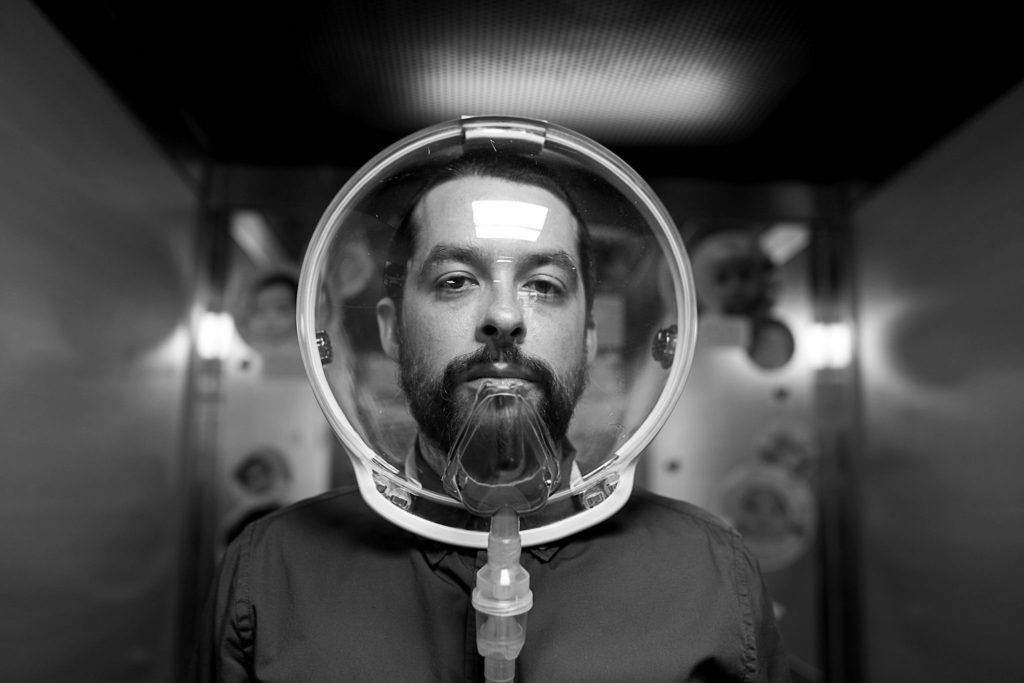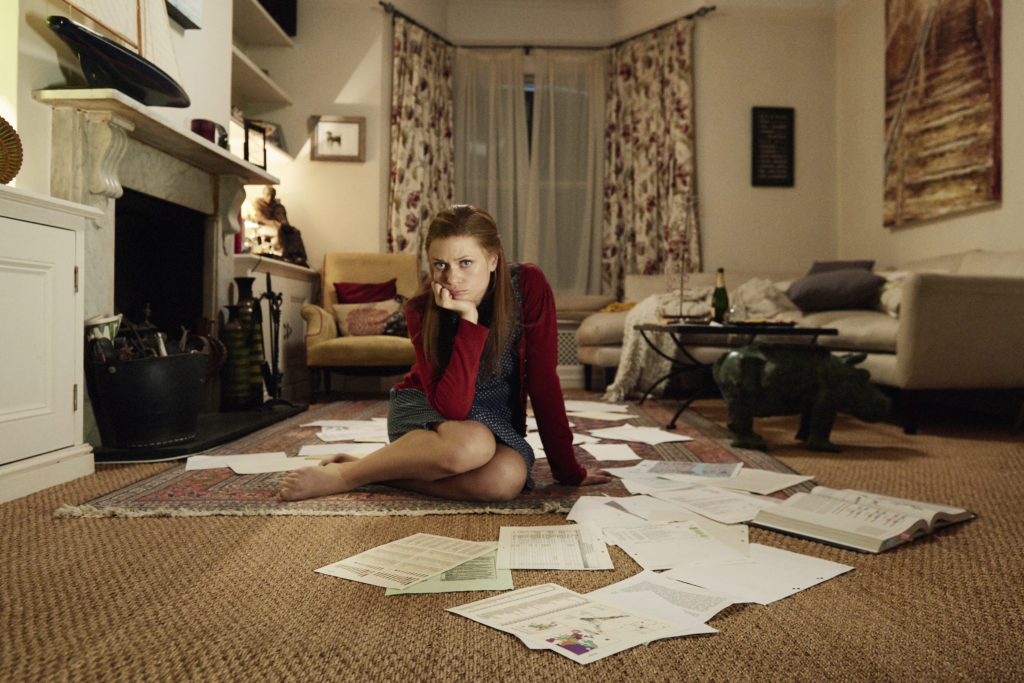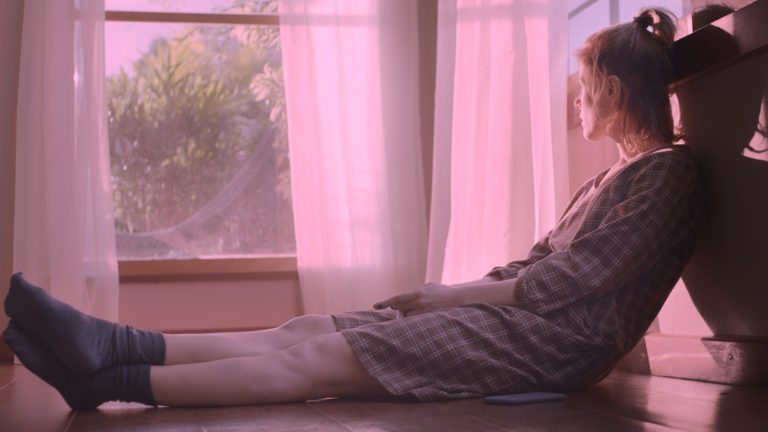The Pink Cloud (2021 | Brazil | 103 minutes | Iuli Gerbase)
One of 2021’s most COVID-y films is somehow not a COVID film at all: Iuli Gerbase’s surreal debut feature was written in 2017 and shot in Brazil in 2019. And yet it is absolutely a heightened sci-fi-lite version of the reality we’ve been seeing for the last year: something deadly has gotten into the air, and all of humanity must shelter in place, indefinitely, until the threat passes. It’s not a perfect coronavirus analogue: in this one, the titular haze outside will literally kill you within ten seconds of encountering it, so not a single person can go outside. No essential workers, no walks around the block, no grocery store runs – every person had to dash inside immediately when the threat was recognized and announced via newscasts and loudspeakers, which for some meant posting up inside shops or businesses. From that point forward, their essential supplies come in via a government-installed tubing system connected to the windows, and the only communication possible with the outside world is virtual, in an even stricter way than in the reality we’ve currently been experiencing. Still, though, it’s shocking how much it predicts – or, really, the way it illuminates how super predictable our current situation was even from years ago.
Giovana (Renata de Lélis) and Yago (Eduardo Mendonça) had just had what under any other circumstances would have been a one-night stand – or at best, a great first date – when they’re woken up to the news that they must hunker down together for the indefinite future. Yago rolls with this news a lot better than Giovana does, and as the days turn into weeks, then months, then years – it’s not strictly defined how much time passes over the course of this film, but it looks to be somewhere pretty close to a decade – their relationship waxes and wanes, mental and emotional health is tested to the limits, escapism becomes exhausting, and outside relationships with those with whom they can only communicate via screens slowly fade away.
The film does a great job of sealing up potential plot holes with little lines of dialogue like “Why doesn’t it pass through the gaps?” (right when I was wondering how everyone’s door and window frames could possibly be airtight enough to be sufficient protection from an airborne gas, that possibility is addressed and dismissed). Nearly every frame is suffused with the soft millennial pink light that menacingly glows through the windows, lending the proceedings a dreamy quality that evokes wistfulness and calm even when the characters are feeling anything but. But at its heart, The Pink Cloud doesn’t care much about being a sci-fi movie. It’s a relationship movie, a tale of two people who are reluctantly shoved together only to find and lose each other over and over again.

The Dog Who Wouldn’t Be Quiet (2021 | Argentina | 73 minutes | Ana Katz)
The titular dog is only a part of the very beginning of this film’s narrative; we move on very quickly. We move on from pretty much everything we see here without enough time to get attached to it.
The sci-fi element is brief as well, even if it does take up the largest chunk of this black & white film’s 73-minute run time, with a COVID-type era where people must either wear diving-style masks or stoop to keep their heads less than four feet above the ground to avoid some never-quite-described airborne threat.
Sebas (Daniel Katz, the filmmaker’s brother) is the film’s lead character and its only connective tissue from one scene to the next, as we see him with many different jobs and social settings and configurations of facial hair: the film was reportedly shot over several years, and apparently for only a few minutes at a time.
This story may be about Sebas’s search for employment or family, but because of the speed with which we skate through each segment, cumulatively it really feels like it’s more simply about the passage of time, or our adaptability as individuals to roll with changing circumstances.
Along with Iuli Gerbase of The Pink Cloud, director Ana Katz participated on Monday in the SIFF roundtable discussion “World Building through Production Design” (a very enjoyable chat which is now archived and available for on-demand viewing, attached to each relevant film’s page on SIFF’s viewing platform or at this direct link). Like Gerbase, Katz also mentions that she’d written the lightly sci-fi part of this film before COVID became a factor, and worried that it was going to read as realist rather than surrealist in these current times. But unlike Gerbase, Katz admits that she really didn’t know what her film was about as she was making it, and still isn’t quite sure how to put it into words now. Unfortunately, that shows.

Love Type D (2019 | United Kingdom | 95 minutes | Sasha Collington)
In this charming and offbeat “deconstructed romantic comedy”, birthed from a 2011 short film that was adapted into this feature’s bluntly hilarious first scene, Frankie (Maeve Dermondy) begins to suspect that her propensity for getting dumped is actually a genetic condition. Encouraged by her most recent ex’s precocious eleven-year-old kid brother, Wilbur (Rory Stroud), she rallies a group of her coworkers, all of whom are also clear candidates for “the dumpee gene”, to participate in a science-fair-ready experiment to test a hypothesis: that if one could go back and date each of their exes again, and then take charge and this time become the one initiating the breakup in this re-do, they can reverse the curse of their genetics.
This vaguely sci-fi premise follows through more on philosophical exploration than hard science, which makes for a fun trip through the ghosts (sometimes literally) of boyfriends past as Frankie wends her way toward figuring out what she needs to change in order to quit getting herself dumped. The film’s production design is packed with jokes (“Toothpaste Doesn’t Cause Cancer; Best Comedy Category Added to Academy Awards!” shouts a news website’s headlines); several moments of particular hilarity come from boyfriends enumerating exactly why they don’t find Frankie to be relationship material; and Wilbur and his even-smaller sidekick Barnaby (Samuel Jones) are an adorably absurd vehicle through which to deliver relationship wisdom, cutting-edge pop science news, and plot points. Loaded with laughs and not short on heart, Love Type D was initially a SIFF 2020 submission before last year’s fest was canceled; it’s a good thing it was able to find a placement this year, as it announces Sasha Collington as a new writer/director to keep a close eye on.
Keep up with us during the festival on Twitter (@thesunbreak) and follow all of our ongoing coverage via our SIFF 2021 page.



